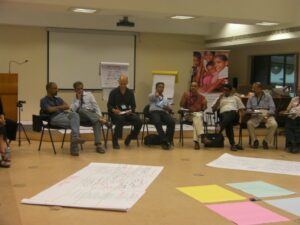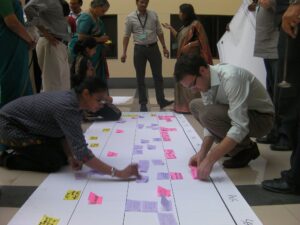A Creative Workshop
On the 8th of November Akshara Foundation organized a Creative Dialogue at the National Institute of Advanced Studies, Bangalore, a vibrant, day-long exchange and cross-fertilization of ideas on How do We Nurture and Resource the Children of Bangalore for a Self-Sustaining Life for the Next Fifteen Years? By end of day they were ideas that transcribed into concrete goals – to be achieved and accomplished.
Participants were drawn from a cross-section of organizations, government and non-governmental, and from among individuals with a role to play.
Outcomes and Outputs – The Purpose of the Meet
The purpose of the workshop was to co-create within and across public and private sectors, an interconnected nurturing and resourcing of the children of Bangalore, fit for the next five to fifteen years. The main objectives were to increase understanding, determine future threats and identify a way forward with the future of the children of Bangalore in mind.
The catalyst for the day was Matt Clarke from the Nowhere Group based in the United Kingdom who emphasized the purpose of the meet as an immersion in the unknown from where participants would traverse together with their collective knowledge, insight and experience, mindful of themselves as creative participants but connected with fellow travelers, in this indeterminate, uncharted space, and emerge at a breakthrough moment in outcomes and outputs. Matt Clarke characterized outcomes as the intangible achievements of mutual understanding, desire and energy to co-create and continue, and outputs as the tangible projects and agendas “to move through current barriers and resisters to change elegantly into a projected future reality.”
Discussion and Group Work
Participants were each engaged in discussion for a minute in which they stated well-founded positions on child-centered issues that ranged, among others, over the status of children, mental and developmental perspectives, health and nutrition, what government could do better and what citizens could do to galvanize, and learning from successful initiatives in order to create new and better jobs for children.
Facilitating the day’s exploratory seeking of definitive end goals was the next round of group work, an exercise “based on the works of the psychologist Kurt Lewin who laid out that the present is strongly affected by the pressures of change and these pressures are constantly offset by the forces that are the resisters to change. That is what defines the present for all of us.”
Participants had to systematically identify the various factors that would affect the collective aim of creating a self-sustaining life for the children of Bangalore. Bangalore, which, as a sub-set of India and the world, has been and will be affected by local, national and international events. The groups ideated, deliberated, set up conversations and dialogues and zeroed in on key areas on which they presented.
A Flawed Delivery System
A dialogue of constructive depth and detail started around health and nutrition which came up as a common concern.
Ashok Kamath, Chairman, Akshara Foundation, shared one of the serious limitations to afflict this sector, which is the extremely low pay of employees working in child healthcare. He said that even though there was no argument in anyone’s mind about the importance of ensuring good nutrition, this anomaly in the delivery system interferes strongly with the deliverables.
He then stressed on synergistic efforts towards uplifting the basic learning and nutrition levels of children, as they are staggeringly low. It is not about money as there is enough of it. It is about the collective efforts that we are yet to make, he emphasized.
Speaking of nutrition he turned towards corruption in government departments, particularly in Bangalore, as an important factor preventing any development despite the resources and the laws.
On Good Governance
A discussion took place on good governance, and Kanchan Bannerjee, Managing Trustee, Akshara Foundation, suggested that government use the good examples already developed by non-profit organizations and put them into effect.
Decentralizing delivery models, government transparency, the shortcomings in our education system in creating children who are inquisitive, and questions of design, structure and leadership entered the dialogue.
Key Value Drivers
The four value drivers that emerged to be taken up at a macro level were: Governance and Leadership; Education; Health and Wellness; and Data Transparency. The groups were asked to place on record their level of self-belief in these as the issues they must coalesce around, these as the issues which would bring about an actual difference in nurturing and resourcing the children of Bangalore for a self-sustaining life.
There was some hesitation, an occasional lack of confidence, a lack of preparedness to commit; there were divergent views, tangential views, a critical note even, sometimes a mismatch with what was on the table and a lack of collectivism. Matt Clarke steered the groups to coherence and clarity and they laid down objectives, actions that would be taken, and a time-frame to achieve them.
The importance of each of the four value drivers were discussed and tangible deliverables were identified. The groups committed to take this creative dialogue forward, agreeing to meet in April 2013, Matt Clarke as catalyst once again. The report concludes that in culmination participants shared their feelings about this experience. The day had been long and packed, but the focus, the thoughts that found expression and the excellent design package of the activities left most of them energized, enriched and inquisitive.




